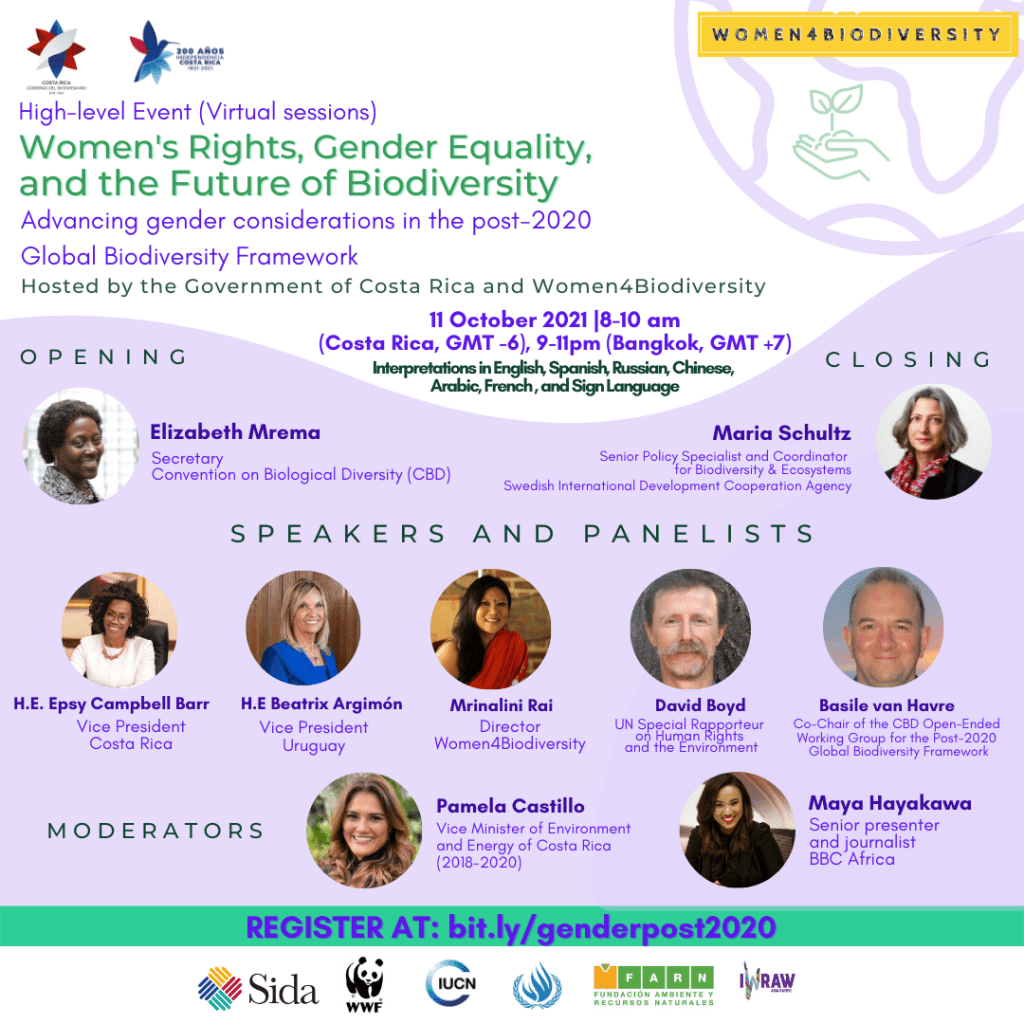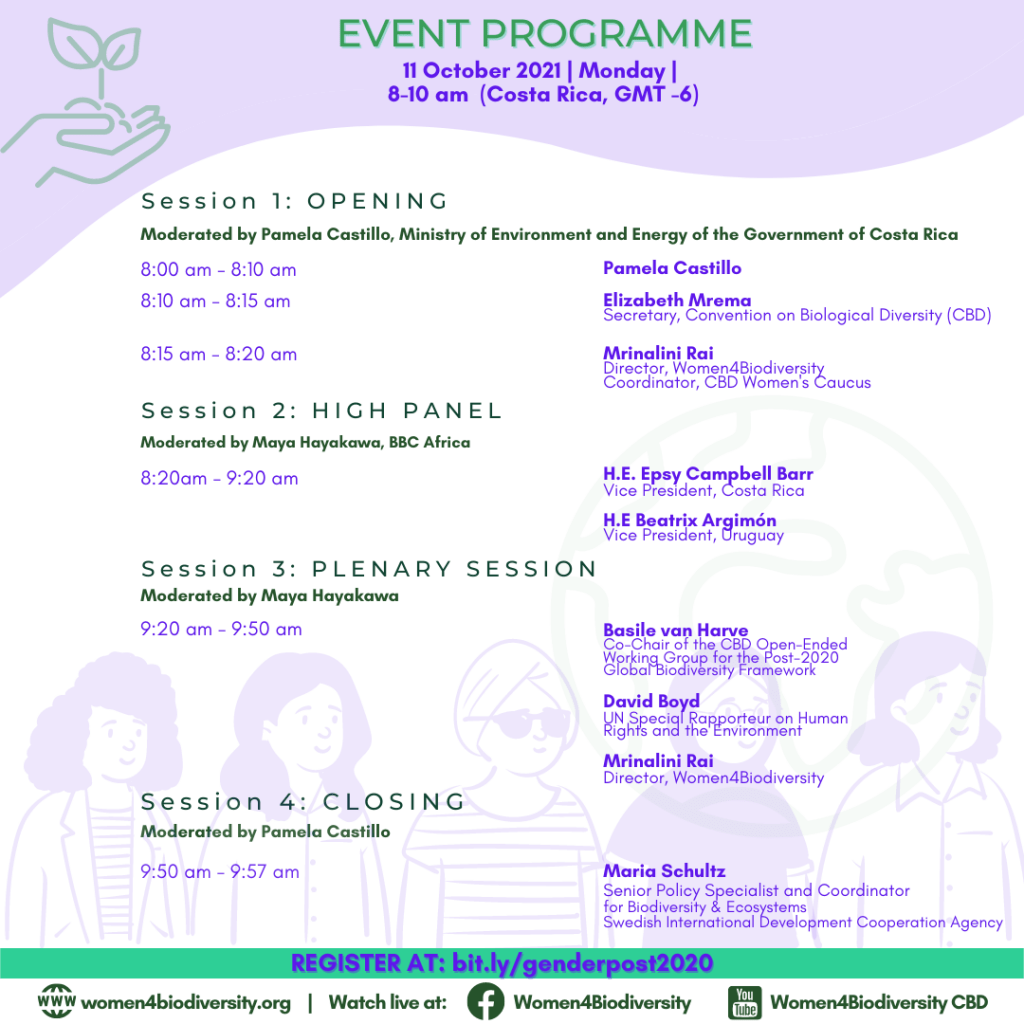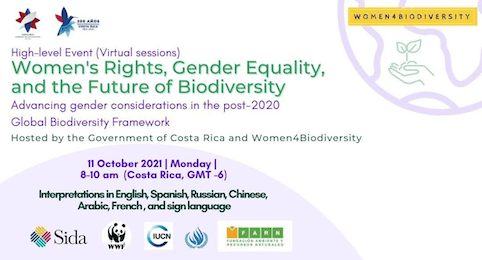REGISTATION HERE
RECORDINGS ALL HERE (English, Spanish, Chinese, French, Russian, Arabic), including Sign Language
Respecting, protecting and fulfilling women’s rights is intrinsic to a new Post-2020 Global Biodiversity Framework that will reconceptualize and transform humanity’s relationship with nature d. Women’s rights are human rights enshrined within the United Nations Charter and the International Bill of Human Rights for every human being on the planet. These rights include the right to live free from violence, slavery, and discrimination; to be educated; to own property; to vote; and to earn a fair and equal wage.
The path for transformative change needs to address the direct and indirect impacts of biodiversity actions and plans depends on full, effective and equal participation of women and girls. It also has to indicate solutions including those which are pioneered or led by women (there are many) that show the benefits of recognizing women as decision makers in natural resource management and especially now, in the design of COVID-19 recovery plans is crucial. 2020 was to be a big year, a time to celebrate nature but also a time to celebrate women. It was the year that saw the celebration of the 25th anniversary of the Beijing Declaration and Platform for Action (BDfA) – the most progressive blueprint for advancing women’s rights. In the path to “build back better” we need to bend the curve of inequality and injustice and integrate human rights in environmental action. For this we need to address the aspirations and contributions that are made by all – including women.
United Nations human rights instruments and mechanisms, including the Convention on the Elimination of All Forms of Discrimination against Women (CEDAW), provide a framework for, and critical support to, efforts to respect, protect and fulfill women’s rights in all policy areas. Gender-responsive approaches identify and lead to action to address gaps and constraints in women’s enjoyment of human rights, including in relation to natural resource management, conservation of biodiversity and restoration of ecosystems.
Principles and obligations derived from international human rights instruments should guide the legislation and policy processes as well as the programming in all sectors and in all phases of the programming process, including the development of the post-2020 global biodiversity framework which is to be adopted in April 2022, in Kunming, China by the 15th Conference of the Parties to the Convention on Biological Diversity (CBD COP15)).
The Convention on Biological Diversity’s (CBD) preamble text recognizes the vital role that women play in the conservation and sustainable use of biodiversity and affirms the need for the full participation of women in the implementation of the convention. Subsequently, the general Principles for the programme of work on the implementation of article 8(j) of the Convention call for the “full and effective participation of women of indigenous and local communities”.
There are limited or no mechanisms in place to systematically map, collect and analyze women’s and girls’ roles and activities regarding biodiversity conservation and sustainable use, including baseline and indicators rendering their contributions virtually invisible. This also applies to the analysis of the extent to which the loss of biodiversity disproportionately burdens women and girls.
In the path to “recover better” from the pandemic and reimagine biodiversity conservation, there is a need to bend the curve of inequality and injustice and integrate human rights in environmental action and policies including the post-2020 Global Biodiversity Framework. The 30-year blueprint for biodiversity action must ensure a new era of conservation that delivers for the rights of women and for the whole of society.
This high level discussion will focus on exploring rights-based approaches to achieve this objective.
This event is being organized on the margins of the CBD COP 15 (Part 1) with will take place from October 11 – 15 in Kunming, China and virtually.
Date: 11 October 2021 (Monday); 8-11am Costa Rica, 9-11pm Bangkok
Duration: 2 hours
Speakers for the event
1. Elizabeth Mrema, Executive Secretary, Secretariat of the Convention on Biological Diversity (CBD)
2. Mrinalini Rai, Director, Women4Biodiversity
3. H.E Ebsy Cambell Barr, Vice President, Costa Rica
4. H.E Beatrix Argimón, Vice President, Uruguay
5. David Boyd, UN Special Rapporteur on Human Rights and Environment
6. Basile van Harve, Co-Chair of Open-Ended Working Group on the post-2020 Global Biodiversity Framework
7. Maria Schultz, Sida
Moderators
Event: Pamela Castillo, Government of Costa Rica
Session : Maya Hayakawa, BBC Africa
Interpretations (7)
English, Spanish, French, Russian, Arabic, Chinese and Sign Language
Partners

Hosted and Organized by




